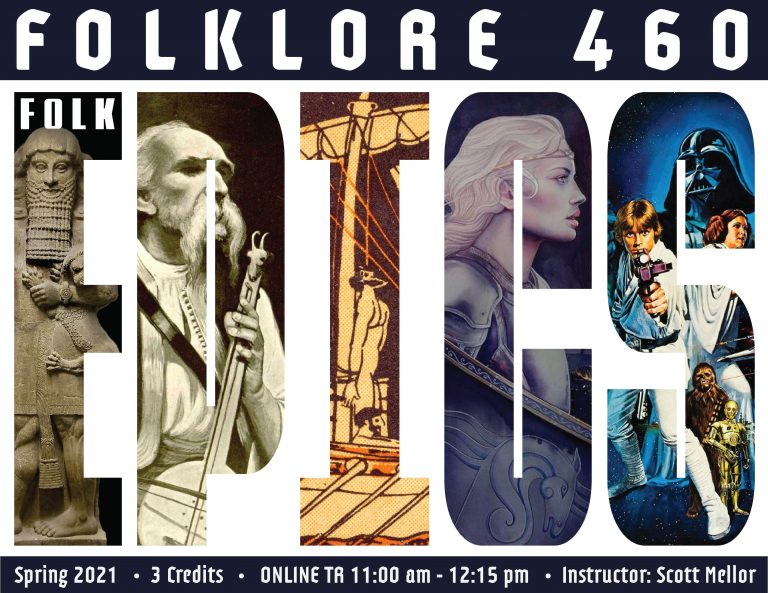FEATURED COURSE!

Folk Epics
What are epics? What is Orally composed story? Narratives like Homer’s Iliad and Odyssey are often viewed as oral epics that have been transposed into writing. Scholars over the past one hundred years have looked at why we like to listen to story and how these stories were put together. In this class we will look at epic through the ages, from Gilgamesh to Star Wars. This course approaches the Folk Epics along theoretical lines, with a look at the oral nature, structure, performance traditions, and epic ideology, from various world areas and what may have taken the place of the oral epic in our own society.
This is an accordion element with a series of buttons that open and close related content panels.
FOLKLORE 102 – Introduction To Comparative US Ethnic And American Indian Studies
(3 credits)
- ONLINE Instructor: Timothy Yu
- DIS 301-308 ONLINE
Course Description: Introduction to comparative ethnic studies, examining race, ethnicity, and indigeneity within the United States. Includes perspectives from African American, American Indian, Asian American, and Chican@ and Latin@ studies.
Prerequisites: None.
FOLKLORE 103 – Introduction To Music Cultures Of The World
(3 credits)
- ONLINE Instructor: Nadia Chana
- DIS 301: ONLINE (R 12:05-12:55 pm)
- DIS 302: ONLINE (R 1:20-2:10 pm)
- DIS 303: ONLINE (R 2:25-3:15 pm)
- DIS 304: ONLINE (R 3:30-4:20 pm)
- DIS 305: ONLINE (F 8:50-9:40 am)
- DIS 306: ONLINE (F 9:55-10:45 am)
- DIS 307: ONLINE (F 11:00-11:50 am)
- DIS 308: ONLINE (F 12:05-12:55 pm)
- DIS 309: ONLINE (F 11:00-11:50 am)
- DIS 310: ONLINE (F 12:05-12:55 pm)
- DIS 311: ONLINE (F 12:05-12:55 pm)
Course Description: An introductory ethnomusicology course providing a variety of ways to approach musics typically not covered in music history courses. Active engagement with these musics within their larger world contexts.
Prerequisites: None.
FOLKLORE 104 – Sacred Places And Journeys
(3 credits)
- ONLINE Instructor: Thomas DuBois
- DIS 301: ONLINE (F 9:55-10:45 am)
- DIS 302: ONLINE (F 9:55-10:45 am)
- DIS 303: ONLINE (F 11:00-11:50 am)
- DIS 304: ONLINE (F 11:00-11:50 am)
- DIS 305: ONLINE (F 12:05-12:55 pm)
- DIS 306: ONLINE (F 1:20-2:10 pm)
Course Description: An introduction to the study of religion through the lens of sacred places and journeys, including pilgrimage.
Prerequisites: None.
FOLKLORE 210 – The African Storyteller
(3 credits)
- Section 001: ONLINE Instructor: Unifier Dyer
- Section 002: ONLINE Instructor: Ruth Ibbi
- Section 003: ONLINE Instructor: Rebecca Ajulu-Bushell
- Section 004: ONLINE Instructor: Nneoma Onwuegbuchi
- Section 005: ONLINE
Course Description: The oral tradition and the written word; the composition of stories, relationship between performer and audience, and transmission of tradition in various African societies.
Prerequisites: None.
FOLKLORE 220 – The Folk Tale
(3 credits)
- ONLINE (TR 9:30-10:45 am) Instructor: Anna Rue
Course Description: Types of heroes, social functions, and tellers; tales from four cultures.
Prerequisites: None.
FOLKLORE 345 – In Translation: The Scandinavian Tale And Ballad
(3 credits)
- ONLINE (TR 1:00-2:15 pm) Instructor: Scott Mellor
Course Description: The genres of ballad and tale, which originate in the distant past, have often been scorned by the literary establishment, but the fact that they survived through centuries of oral transmission until they were finally recorded in the fairly recent past testifies to their lasting existential appeal. The stories these texts tell are dashingly entertaining and often deeply disturbing: they may offer a profoundly fatalistic view of existence, but they may also voice an angry and, at the same time, humorous protest against oppression. When this narrative type was discovered by scholars and the societal elite about 1800, it inspired many first-rank Nordic authors, e.g., Hans Christian Andersen, Henrik Ibsen, Selma Lagerlöf; and in the 20th century it has cast its spell over Isak Dinesen, Villy Sørensen, and Pär Lagerkvist and its influence has moved from literary to other media today. The course examines both the original literature and its modern “imitations” as well as gives an introduction to the critical methodologies that have recently been developed to deal with this seemingly simple, but in reality highly sophisticated, narrative.
Prerequisites: Junior status or consent of instructor.
FOLKLORE 437 – American Indian Women
(3 credits)
- ONLINE (TR 2:30-3:45 pm) Instructor: Sasha Suarez
Course Description: Examines and interprets the roles of American Indian women in traditional societies, and in contemporary North America.
Prerequisites: Sophomore standing.
FOLKLORE 460 – Folk Epics
(3 credits)
- ONLINE (TR 11:00 am – 12:15 pm) Instructor: Scott Mellor
Course Description: What are epics? What is Orally composed story? Narratives like Homer’s Iliad and Odyssey are often viewed as oral epics that have been transposed into writing. Scholars over the past one hundred years have looked at why we like to listen to story and how these stories were put together. The mode of transmission may change but some components of storytelling remain remarkable the same. The American scholars Milman Parry and Albert B Lord recorded epics in Yugoslavia performed by guslari, and described them as having certain features, like formulaic expressions and mythic patterns that influence the way in which we tell story to this day. In this class we will look at epic through the ages, from Gilgamesh to Star Wars. This course approaches the Folk Epics along theoretical lines, with a look at the oral nature, structure, performance traditions, and epic ideology, from various world areas and what may have taken the place of the oral epic in our own society.
Prerequisites: Junior status or consent of instructor.
